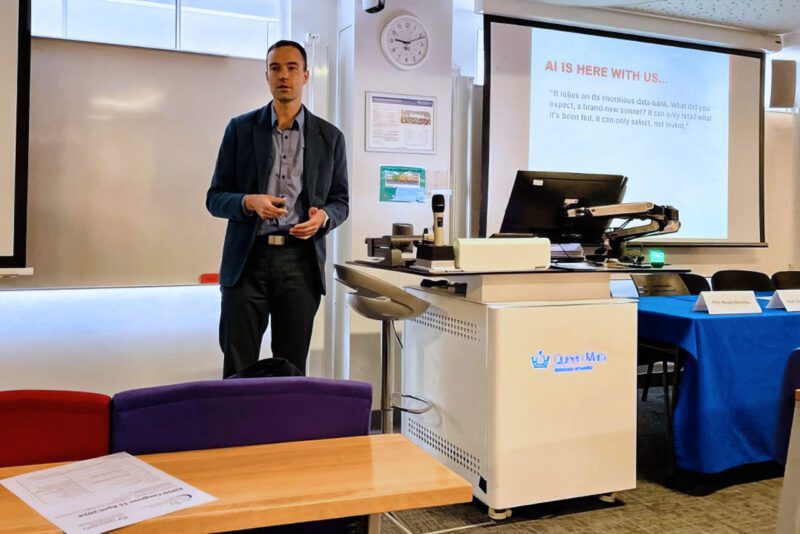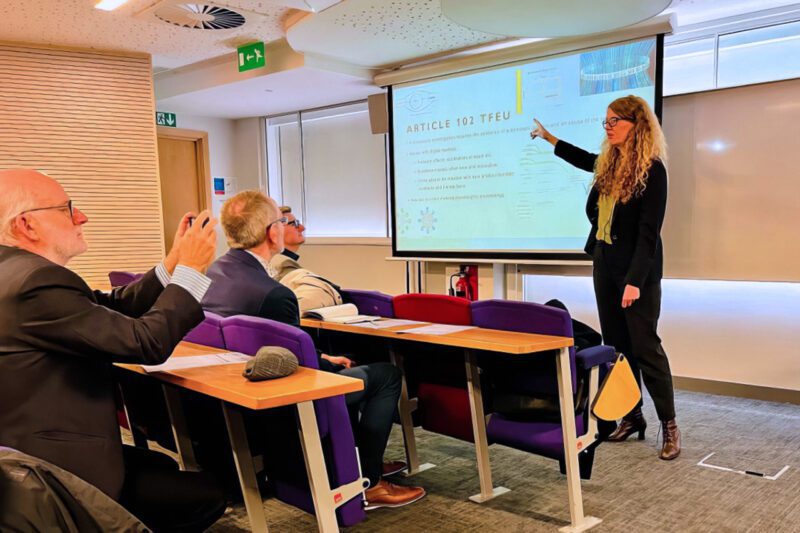The Algorithmic Classroom
South Korea’s ambitious experiment with AI in classrooms holds lessons for the world
Striking a balance between incentives and innovation

Copyright has been pivotal in the creative industries, offering creators exclusive rights to their work. Yet, the advent of the digital age has radically altered the creation, sharing, and accessibility of information. The pressing challenge now lies in harmonizing this age-old principle with the digital era’s open, collaborative ethos, accelerated by the advent of generative AI. The critical question is whether copyright can evolve to complement the modern flow of information without impeding the innovation it seeks to foster.
Copyright was conceived as a remedy to the scarcity of information in the aftermath of the mid-1400s printing press innovation. Before its advent, the manual reproduction of content was so arduous and costly that the notion of copyright was superfluous. The enactment of laws like the British Statute of Anne in 1710 marked a turning point by endowing creators with sovereign rights over their work’s reproduction and distribution. This legal framework spurred creativity, as it enabled authors and artists to derive financial benefit from their works. Yet, today’s landscape, marked by the internet, generative AI, and an ideology favoring open markets, is at odds with these traditional copyright provisions.
On April 11, 2024, the Queen Mary University of London’s Centre for Commercial Law Studies became the nexus for pivotal discourse on copyright’s future, hosting the EIPIN Congress conference. Esteemed intellectual property scholars convened to engage in rigorous debate and discussion, seeking pathways for copyright adaptation in the digital epoch. Their goal: to ensure that these legal structures not only withstand the tests of digital transformation but also continue to underpin the creative and innovative dynamism by securing open access to the vast information pool that fuels innovation.
Generative AI’s capacity to create original works, such as music, art, and literature, introduces complex challenges to traditional copyright frameworks. Ownership becomes a contentious issue — should copyright be attributed to the AI’s programmer, the user who inputs the prompts, or the AI itself, despite lacking legal personhood? Consider an AI trained on extensive medical image datasets that discovers a novel disease biomarker. If this biomarker were copyrighted, it might legally belong to the AI developer or their company. Yet, this poses a dilemma: restricting access to this pivotal discovery could stymie further research and the progression of diagnostic and therapeutic advancements.
The digital era’s hallmark is the rapid dissemination of information, a phenomenon that runs counter to copyright’s doctrine of limited exclusivity.
The European Union (EU) is proactively engaging with the nuanced shifts in copyright that AI brings. One key measure is the §4(3) opt-out clause of the Copyright Directive (Directive 2011/77/EU), which empowers copyright holders to prevent the utilization of their works in text and data mining (TDM) processes crucial for AI development. In addition, the newly enacted EU AI Act fortifies the legal milieu, governing AI’s creation, deployment, and usage across the Union, with an emphasis on transparency. This stipulation obliges AI developers to disclose the datasets that inform their AI systems, enabling copyright holders to verify the use of their materials and assert their §4(3) rights if necessary. Yet, experts contend that the opt-out provision could inadvertently impede AI innovation, as broad assertions of these rights might restrict the pool of data available for training AI systems. Moreover, the logistics of applying this opt-out facility present their own set of challenges.

Professor Peter Mezei, University of Szeged, member of the European Copyright Society.
In his paper, A Saviour or a Dead End? Reservation of Rights in the Age of Generative AI, Professor Peter Mezei of the University of Szeged and the member of European Copyright Society underscores the emergent copyright complexities. He attributes this surge to three main factors:
These elements are accelerating the development of Generative AI, igniting a competition for market dominance and regulatory influence. Professor Mezei also scrutinizes the §4(3) opt-out challenges, probing into the consequences for licensing agreements post-opt-out, the potential disadvantages authors might face from opting out (FOMO), obligations for rights holders concerning their data, and the feasibility of opting out in relation to open versus private datasets.
Amidst this fast-paced innovation, constructing a legal framework that concurrently promotes innovation and safeguards intellectual property rights is imperative. The EU’s opt-out provision and the AI Act are steps forward, yet the path ahead is fraught with intricacies. Striking a balance between innovation and intellectual property rights is essential for the principled evolution and utilization of generative AI.
With more than two decades of insight into EU and competition law, Dr. Alexandra von Westernhagen brings to light pivotal EU legislative advances impacting the tech industry, namely, the Artificial Intelligence Act (AI Act) and the Digital Markets Act (DMA). The AI Act delineates explicit boundaries, notably by:

Dr. Alexandra von Westernhagen at the EIPIN Congress conference.
Dr. von Westernhagen illustrates banned activities under the AI Act, such as the deployment of subtle techniques to manipulate behaviors, social scoring mechanisms, and real-time facial recognition technology by law enforcement in public domains, barring exceptions.
On the other hand, the DMA seeks to invigorate EU’s digital market competitiveness by:
Yet, Dr. von Westernhagen expresses apprehension about the adequacy of these regulations. She scrutinizes whether merger control rules are rigorous enough to preclude suppressive contractual involvements, as demonstrated by past consolidations, such as Facebook’s acquisition of WhatsApp. Additionally, she ponders the DMA’s scope, questioning its effectiveness in addressing emerging areas like cloud services and foundational technology models.
A significant point of concern is the EU’s regulatory velocity in an era of swift technological change. Like many recent legal measures, the AI Act and DMA are informed by historical precedents, which may not be agile enough to match the rapid cadence of innovation. The average two-year legislative timeframe poses a risk of the EU lagging behind rather than spearheading a responsible, competitive digital landscape. Although the Commission possesses the authority to recognize novel services under the DMA, there remains a question of whether regulations can be enforced promptly and effectively.

Adding to the dialogue, Professor Manuel Desantes Real, an authority with a former vice-presidency at the European Patent Office and co-leadership at the Global Innovation Law & Policy Research Group, points to the sluggish evolution of the EU’s workforce development. He contends that the prevailing system lags behind, unequipped to meet the accelerating demands of the 21st century’s innovation race. Such a lag underlines a widening chasm between EU governance and the broader, agile global tech arena, casting doubt on the effectiveness of the well-regarded “Brussels effect.” This situation signals a pressing need for a reformed system that embraces academic partnerships to stay apace in the swiftly advancing technological milieu.
The digital era’s hallmark is the rapid dissemination of information, a phenomenon that runs counter to copyright’s doctrine of limited exclusivity. Enforcing copyright in this landscape is increasingly complex, as emphasized by the European Union Intellectual Property Office’s (EUIPO) September 2023 report, which states, “The technology used to download copyright-protected content is irrelevant, as is the question of whether the work was downloaded in its entirety or in part.” This statement underscores the prevalence of unauthorized file-sharing networks and the overarching enforcement difficulties in the digital age.
This reorientation, from proprietary ownership to shared advantage, dovetails with the ethos of open-source initiatives and the inherent nature of generative AI.
In the realm of open markets, the pendulum swings towards prioritizing unrestricted information access over proprietary control. This is evident in the rise of open-source software, where collaborative development has been a catalyst for innovation — epitomized by entities like the Linux Foundation, Github, and Mozilla. This spirit of cooperation is now permeating AI-driven creative processes, suggesting a paradigm shift towards collective innovation.
Flourishing through vast data amalgamations and collaborative efforts, Generative AI epitomizes the synergy of collective intellect while copyright remains traditionally focused on safeguarding individual creators. The contradiction nurtures a shift towards appreciating the communal over the singular. This reorientation, from proprietary ownership to shared advantage, dovetails with the ethos of open-source initiatives and the inherent nature of generative AI.
Envisioning the horizon, copyright might adapt to recognize and remunerate contributions that serve the broader creative ecosystem instead of only individual endeavors. Such an adaptive copyright could cultivate a symbiosis with technological advancements, heralding an era where creativity is not just an individual pursuit but a shared and enriching experience for the collective.
Related Content
Comments
Deep Dives

Featuring
Clarisse Awamengwi
IE Correspondent
July 17 - 12:00 PM EST

Featuring
Russell McLeod
July 24 - 12:00 PM EST
RECENT
Editor's Picks
Webinars
News & Events
Subscribe to our newsletter to receive updates about new Magazine content and upcoming webinars, deep dives, and events.
Become a Premium Member to access the full library of webinars and deep dives, exclusive membership portal, member directory, message board, and curated live chats.
At Impact Entrepreneur, we champion fearless, independent journalism and education, spotlighting the inspiring changemakers building the Impact Economy. Diversity, equity, sustainability, and democracy face unprecedented threats from misinformation, powerful interests, and systemic inequities.
We believe a sustainable and equitable future is possible—but we can't achieve it without your help. Our independent voice depends entirely on support from changemakers like you.
Please step up today. Your donation—no matter the size—ensures we continue delivering impactful journalism and education that push boundaries and hold power accountable.
Join us in protecting what truly matters. It only takes a minute to make a real difference.
0 Comments